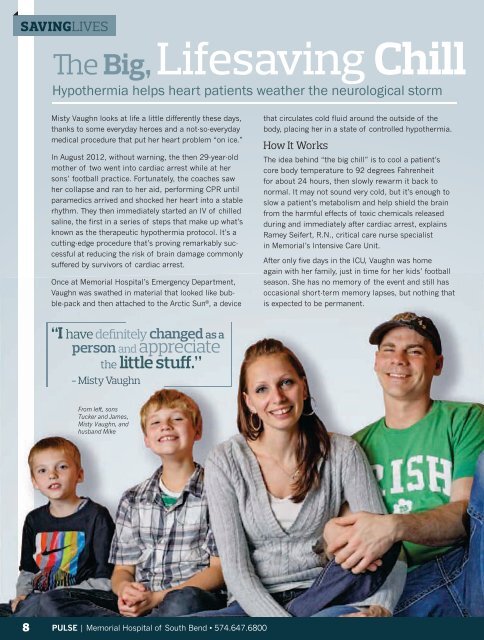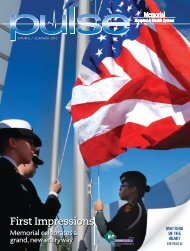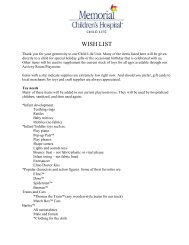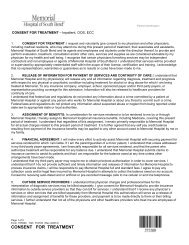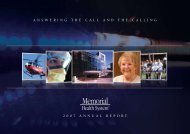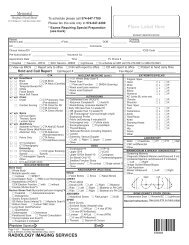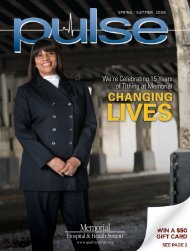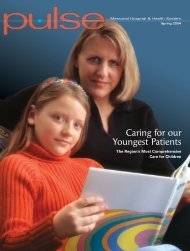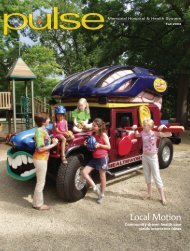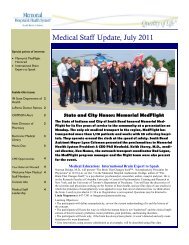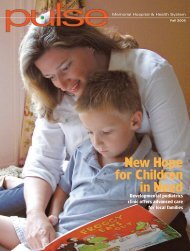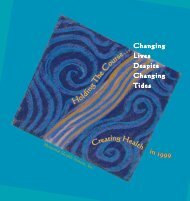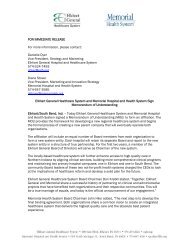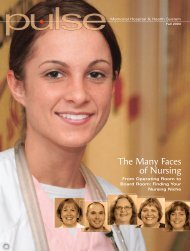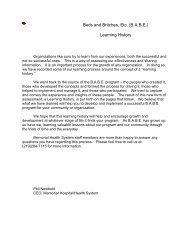saVINGLIVESThe Big, Lifesaving ChillHypothermia helps heart patients weather the neurological stormMisty Vaughn looks at life a little differently these days,thanks to some everyday heroes and a not-so-everydaymedical procedure that put her heart problem “on ice.”In August 2012, without warning, the then 29-year-oldmother <strong>of</strong> two went into cardiac arrest while at hersons’ football practice. Fortunately, the coaches sawher collapse and ran to her aid, performing CPR untilparamedics arrived and shocked her heart into a stablerhythm. They then immediately started an IV <strong>of</strong> chilledsaline, the first in a series <strong>of</strong> steps that make up what’sknown as the therapeutic hypothermia protocol. It’s acutting-edge procedure that’s proving remarkably successfulat reducing the risk <strong>of</strong> brain damage commonlysuffered by survivors <strong>of</strong> cardiac arrest.Once at <strong>Memorial</strong> <strong>Hospital</strong>’s Emergency Department,Vaughn was swathed in material that looked like bubble-packand then attached to the Arctic Sun ® , a devicethat circulates cold fluid around the outside <strong>of</strong> thebody, placing her in a state <strong>of</strong> controlled hypothermia.How It WorksThe idea behind “the big chill” is to cool a patient’score body temperature to 92 degrees Fahrenheitfor about 24 hours, then slowly rewarm it back tonormal. It may not sound very cold, but it’s enough toslow a patient’s metabolism and help shield the brainfrom the harmful effects <strong>of</strong> toxic chemicals releasedduring and immediately after cardiac arrest, explainsRamey Seifert, R.N., critical care nurse specialistin <strong>Memorial</strong>’s Intensive Care Unit.After only five days in the ICU, Vaughn was homeagain with her family, just in time for her kids’ footballseason. She has no memory <strong>of</strong> the event and still hasoccasional short-term memory lapses, but nothing thatis expected to be permanent.“I have definitely changed as aperson and appreciatethe little stuff.”- Misty VaughnFrom left, sonsTucker and James,Misty Vaughn, andhusband Mike8 PULSE | <strong>Memorial</strong> <strong>Hospital</strong> <strong>of</strong> <strong>South</strong> <strong>Bend</strong> • 574.647.6800
Vaughn honored the football coaches, many <strong>of</strong> whomshe has known since she was a young girl, with anAmerican Heart Association ® Heroes Award in October.She plans to take a CPR course so she can pay forwardthe gift <strong>of</strong> life that started with her sons’ coachesknowing what to do that day.“If it was going to happen, I’m glad it happened the wayit did, or I wouldn’t be here,” says Vaughn, who turned30 in September. “I have definitely changed as a personand appreciate the little stuff.”The Biggest Advancement Since CPRSince 2006, the survival rate among patients broughtto <strong>Memorial</strong> after suffering ventricular fibrillation, asVaughn did, is almost 73 percent. Nearly all returnedhome within three to five days <strong>of</strong> admission with little tono long-term neurological problems. By contrast, a fiveyearstudy published in 2011 by the Centers for DiseaseControl and Prevention placed the overall survival rateat just above 30 percent for patients like Vaughn. “Thisis the biggest advancement in resuscitation medicine indecades, possibly since the advent <strong>of</strong> CPR more than50 years ago,” Seifert says.<strong>Memorial</strong> was a leader in implementing the hypothermiaprotocol locally in late 2006. Emergency physicians andEMS medical directors Keith Sherry, M.D., and BruceSpeicher, M.D., and Gary Fromm, M.D., medical director<strong>of</strong> <strong>Memorial</strong>’s ICU, championed the cause, whichrequired the support <strong>of</strong> both local hospitals to ensurethat the benefits <strong>of</strong> therapeutic hypothermia areavailable to everyone in this area. Drs. Sherry andSpeicher then reached out to the EMS community inSt. Joseph County, authorizing the procedure forstarting the protocol in the field. Almost alladvanced life support ambulances in St. JosephCounty now have refrigerators on board thatcontain the cold saline needed to begin thecooling process, which is continued onarrival to the Emergency Department.Therapeutic hypothermia is a valuableand powerful tool in promotingneurological recovery in victims <strong>of</strong>cardiac arrest who are successfullyresuscitated. However, health carepersonnel and the American HeartAssociation continue to emphasizethe importance <strong>of</strong> high-quality CPRand early defibrillation to givepatients a chance <strong>of</strong> resuscitationand an opportunity to benefit fromtherapeutic hypothermia.Tough Call Wasthe Right CallUse <strong>of</strong> the hypothermia protocol on pregnant womenhas not been widely embraced because <strong>of</strong> a lack <strong>of</strong> dataabout how it affects the fetus.But one February night in 2009, <strong>Memorial</strong> emergencyphysician Rajalakshmy Sundararajan, M.D., inconsultation with other physicians, made the tough callto use the technique on 33-year-old Cindee Goodling, whowas 20 weeks pregnant and had been resuscitated from aprolonged cardiac arrest in a local church. This is particularlysignificant in light <strong>of</strong> a recent study presented at theAmerican College <strong>of</strong> Cardiology that indicated changesbrought about by pregnancy can increase a woman’srisk <strong>of</strong> heart attack during pregnancy. High-quality CPR,provided by community members prior to the arrival <strong>of</strong>paramedics, was also an important factor in her successfulresuscitation.Not only did both mother and baby survive, but Goodlingwas back to work within days after leaving <strong>Memorial</strong>. Fourmonths later, she gave birth to a healthy baby boy, Collin,now 3 years old. During resuscitation, Goodling was alsoshocked several times. In a fitting recognition <strong>of</strong> this,Collin’s nickname is “Zap.” During EMS Night at CoveleskiStadium in 2011, Goodling and Zap threw out the firstpitch in appreciation <strong>of</strong> all those who had made theirsurvival possible.Goodling’s story was featured on MSNBC’s websiteand documented in an article in the international journalAnnals <strong>of</strong> Emergency Medicine, collaboratively authored byAakash Chauhan, M.D.; Harsha Musunuru, B.S.;Michael Donnino, M.D.; Michael T. McCurdy, M.D.;Vinod Chauhan, M.D.; and Mark Walsh, M.D.Simple Steps That Can Save Your LifeTake a free, confidential risk assessment that couldsave your life or greatly improve your quality <strong>of</strong>life. Go to whatsmyrisk.org, where you can learnmore about your health and whether you’re at riskfor conditions such as heart disease, joint pain,diabetes, sleep disorders, obesity and stroke. Eachassessment is quick and easy. If you are at risk, call800-647-6800 to speak with one <strong>of</strong> The HealthPr<strong>of</strong>essionals at <strong>Memorial</strong> <strong>Hospital</strong> <strong>of</strong> <strong>South</strong> <strong>Bend</strong>.<strong>Spring</strong> <strong>2013</strong> | quality<strong>of</strong>life.org9


